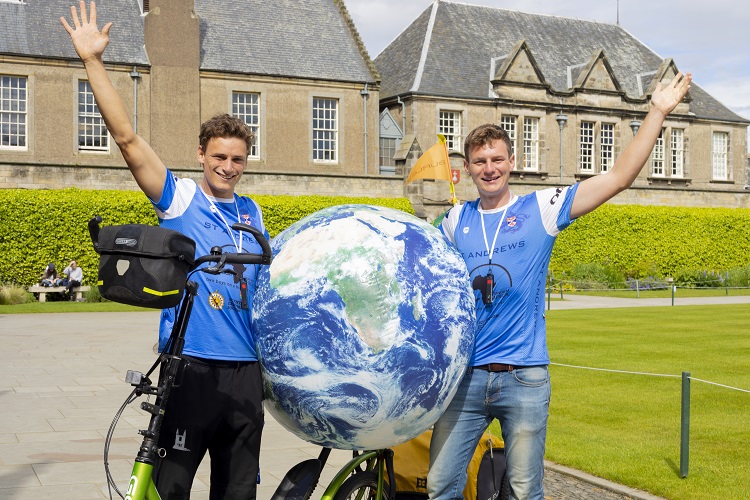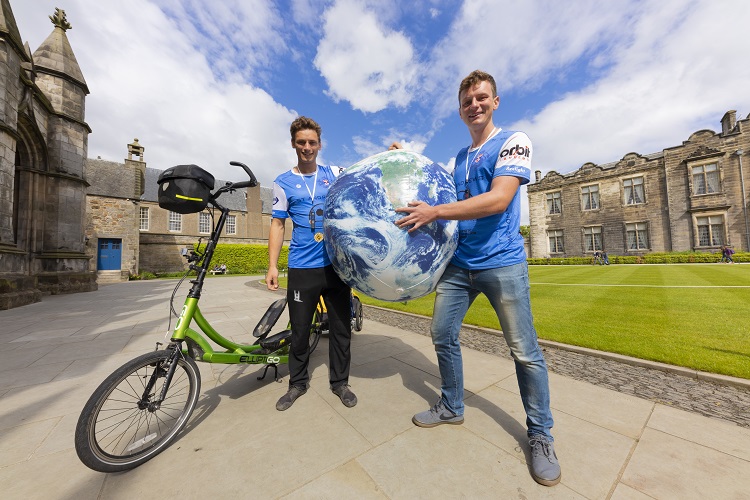African expedition a sight for sore eyes

Two intrepid students return to the University of St Andrews after completing a 10,000km cycling expedition through Africa to help in the fight against preventable blindness and deafness.
Around 285 million people in the world are estimated to be visually impaired, with 360 million hearing impaired. Sadly, the majority of cases are preventable or treatable if diagnosed promptly. Arclight Tandem Africa, an eight-month long expedition from Cairo to Cape Town by students Alex McMaster and Merlin Hetherington, distributed over 1000 Arclight diagnostic devices to health care workers in the region.
The University of St Andrews has supported the development of the low cost solar powered device over the past five years. It is an ophthalmoscope and an otoscope that enables users to make instant on-the-spot decisions speeding up access to treatment.
Starting their journey in North Africa in October 2018 on World Sight Day, Alex and Merlin cycled through some of the most remote parts of Africa. The boys arrived in Cape Town on 15 May after 217 days on the road and having trained 843 people, distributed 1050 Arclights, provided 22 training sessions and covered 10,450km in total: 4600 on the tandem, 350km on foot and 4600km on ElliptiGO bikes.
During their expedition they encountered problems with police, bandits and a tribal conflict, before climbing through the notorious highlands of Ethiopia. Challenges half way through the journey led to the duo having to think creatively when injuries meant they could no longer continue on their tandem. After a few days of recovery and brainstorming ideas on how to proceed, they came up with a solution and took their blueprints to a local welder. By the next evening the welder had built their new vehicle: a pull-along metal cart with bicycle wheels. Alex and Merlin loaded up their kit and supplies and set off on their journey south towards Cape Town across the Masai Steppe.
Crossing the Masai Steppe in Tanzania, a huge area of grassland and forest, Alex and Merlin were joined by two Morani (Masai warriors) to help navigate the terrain and wildlife. The Steppe is rich in wildlife, including lions, elephants, zebras and giraffes, and while the trail was remote it was not without its hazards, including inquisitive animals and poachers.
Travelling through the dense grassland proved difficult, especially when rain turned the ground in to a thick, heavy mud, making the cart even harder to pull along. After walking across Tanzania the boys took delivery of a pair of stand-up ElliptiGO bikes in Malawi and continued their journey to Cape Town.
After 10,460km, 13 punctures, several instances of debilitating illness and travelling through some of the world’s most remote areas, Alex and Merlin crossed the last stretch over the Kalahari and Namib deserts reaching their final destination of Cape Town on 15 May.
Speaking about the expedition, Merlin Hetherington (below left) said: “Given the statistics on preventable blindness we felt moved to action. No one should live any part of their life needlessly blind. The Arclight is an incredible tool that if given to the right people will help improve the lives of thousands.”
Alex McMaster (above right) added: “It’s been a learning experience for both of us. We had to make sure our knowledge of eye care was sufficient for teaching and knowledge of disease was relevant to the setting we are in. Initially we would be a bit apprehensive but now we are quite happy going in and training 80 to 100 students at a time, so it’s been a great experience for us too.”
The development of the Arclight has been led by William J Williams, honorary research fellow with the University’s Global Health Team, in collaboration with the Fred Hollows Foundation and the International Agency for the Prevention of Blindness.
Dr Andrew Blaikie, Senior Lecturer in the Global Health Team and Consultant Ophthalmologist with NHS Fife, who has been assisting with evaluation and implementation of Arclight over the past four years, said: “What Alex and Merlin have done is a wonderful achievement both for themselves and the many hundreds of health care workers who now own an Arclight device.
“Early diagnosis using the Arclight is key to good outcomes for both eye and ear disease especially in the young. Their expedition, I am sure, will now go on to benefit many thousands of people over the coming years, preventing needless disability. This is a legacy for which they should be immensely proud.”
The expedition is supported by the University of St Andrews, the Scientific Exploration Society, and world record holding endurance cyclist Mark Beaumont, who added: “My congratulations and respect to Alex and Merlin for completing an engaging, difficult and well-told adventure from Cairo to Cape Town, adapting to many setbacks along the way.

“Throughout the journey they took the time to engage in educational events about Arclight, a brilliant leap forwards in innovation around the diagnosis of cataracts and eye disease. Chapeau! I’m sure the University of St Andrews, your friends and family are rightly proud of your adventures and I am sure there will be a significant legacy from your adventures.”
Not content with this, Alex and Merlin returned to take part in this year’s Edinburgh Marathon on Sunday 26 May in a final push to their crowdfunding campaign. They set themselves an ambitious target to raise £20,000 and, to date, have secured just over £18,000. Donations can be made via SaintsFunder – all donations go entirely towards funding Arclight devices and the associated materials required for future training sessions.
The expedition was supported by the University of St Andrews R&A International Scholarship award, Saints Sport, the School of Medicine and the Scientific Exploration Society, as well as fellow students, alumni, staff and friends.
Category University news